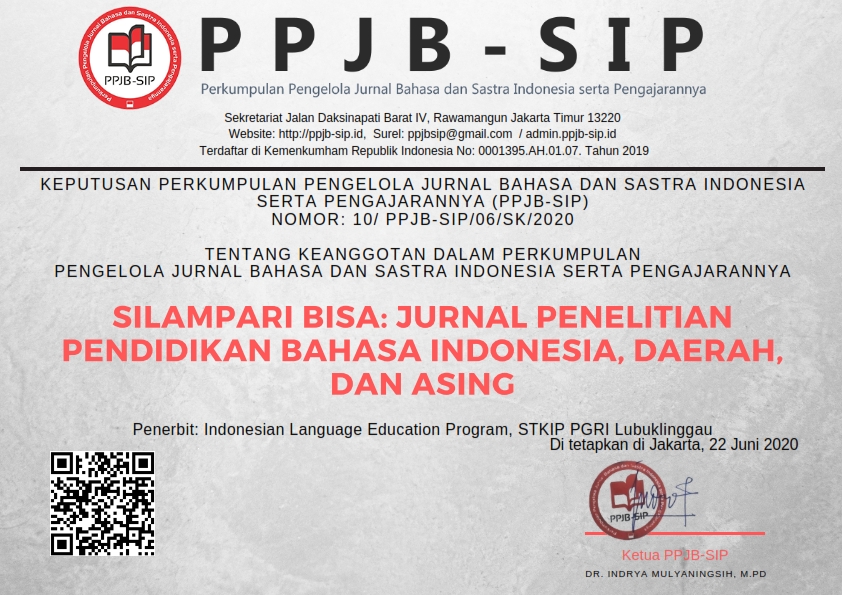WHAT SCHOOL INSTITUTION CAN LEARN FROM MULTI-PLAYER ONLINE GAMES DEVELOPMENT AND IT CHALLENGE FOR PUPILS
Abstract
This study analyzes verbal violence against female adolescents playing multiplayer online games in Jambi City from a sociolinguistic perspective. Communication features in multiplayer online games often involve verbal violence, especially against female players who are considered to have less playing skills than male players. This study uses qualitative data obtained through interviews and FGDs, which were analyzed using NVIVO. This study shows that patronizing and criticizing behavior is common among FF players. Verbal violence results in changes in player behavior. Currently, the Jambi City Government does not have a specific instrument to address the problem of verbal violence among adolescents, especially those aged 10 to 14 years.
References
Beres, N. A., Frommel, J., Reid, E., Mandryk, R. L., & Klarkowski, M. (2021). Don’t you know that you’re toxic: Normalization of toxicity in online gaming. Conference on Human Factors in Computing Systems - Proceedings. https://doi.org/10.1145/3411764.3445157
Brick, N. E., Breslin, G., Shevlin, M., & Shannon, S. (2022). The impact of verbal and physical abuse on distress, mental health, and intentions to quit in sports officials. Psychology of Sport and Exercise, 63, 102274. https://doi.org/10.1016/J.PSYCHSPORT.2022.102274
Chapman, J. R., & Rich, P. J. (2018). Does educational gamification improve students’ motivation? If so, which game elements work best? Journal of Education for Business, 93(7). https://doi.org/10.1080/08832323.2018.1490687
Cote, A. C. (2017). “I Can Defend Myself”: Women’s Strategies for Coping with Harassment while Gaming Online. Games and Culture. https://doi.org/10.1177/1555412015587603
Crouch, J. L., Irwin, L. M., Wells, B. M., Shelton, C. R., Skowronski, J. J., & Milner, J. S. (2012). The Word Game: An innovative strategy for assessing implicit processes in parents at risk for child physical abuse. Child Abuse and Neglect. https://doi.org/10.1016/j.chiabu.2012.04.004
Deng, Z., & Li, Y. (2021). Players’ rights to game mods: Towards a more balanced copyright regime. Computer Law and Security Review. https://doi.org/10.1016/j.clsr.2021.105634
Dr. Sonia George, D. B. (2021). Exploring the impact of internet gaming disorder on adolescent gamers using thematic analysis. Psychology and Education Journal, 58(2). https://doi.org/10.17762/pae.v58i2.2972
Dube, S. R., Li, E. T., Fiorini, G., Lin, C., Singh, N., Khamisa, K., McGowan, J., & Fonagy, P. (2023). Childhood verbal abuse as a child maltreatment subtype: A systematic review of the current evidence. Child Abuse & Neglect, 144, 106394. https://doi.org/https://doi.org/10.1016/j.chiabu.2023.106394
Elias-Lambert, N., Boyas, J. F., Black, B. M., & Schoech, R. J. (2015). Preventing substance abuse and relationship violence: Proof-of-concept evaluation of a social, multi-user, tablet-based game. Children and Youth Services Review. https://doi.org/10.1016/j.childyouth.2015.04.007
Festl, R., Reer, F., & Quandt, T. (2019). Online sexual engagement and psychosocial well-being: The mediating role of sexual victimization experiences. Computers in Human Behavior. https://doi.org/10.1016/j.chb.2019.04.010
Gray, K. L., Buyukozturk, B., & Hill, Z. G. (2017). Blurring the boundaries: Using Gamergate to examine “real” and symbolic violence against women in contemporary gaming culture. Sociology Compass. https://doi.org/10.1111/soc4.12458
Holt-Lunstad, J., Smith, T. B., & Layton, J. B. (2010). Social relationships and mortality risk: A meta-analytic review. In PLoS Medicine. https://doi.org/10.1371/journal.pmed.1000316
Jagayat, A., & Choma, B. L. (2021). Cyber-aggression towards women: Measurement and psychological predictors in gaming communities. Computers in Human Behavior. https://doi.org/10.1016/j.chb.2021.106753
Kavanagh, E., & Brown, L. (2020). Towards a research agenda for examining online gender-based violence against women academics. Journal of Further and Higher Education, 44(10). https://doi.org/10.1080/0309877X.2019.1688267
Lopez-Fernandez, O., Jess Williams, A., & Kuss, D. J. (2019). Measuring female gaming: Gamer profile, predictors, prevalence, and characteristics from psychological and gender perspectives. Frontiers in Psychology, 10(APR). https://doi.org/10.3389/fpsyg.2019.00898
Mao, E. (2021). The structural characteristics of esports gaming and their behavioral implications for high engagement: A competition perspective and a cross-cultural examination. Addictive Behaviors. https://doi.org/10.1016/j.addbeh.2021.107056
McLean, L., & Griffiths, M. D. (2019). Female Gamers’ Experience of Online Harassment and Social Support in Online Gaming: A Qualitative Study. International Journal of Mental Health and Addiction, 17(4). https://doi.org/10.1007/s11469-018-9962-0
Mihan, R., Anisimowicz, Y., & Nicki, R. (2015). Safer with a partner: Exploring the emotional consequences of multiplayer video gaming. Computers in Human Behavior. https://doi.org/10.1016/j.chb.2014.11.053
Nexø, L. A., & Kristiansen, S. (2023). Players Don’t Die, They Respawn: a Situational Analysis of Toxic Encounters Arising from Death Events in League of Legends. European Journal on Criminal Policy and Research, 29(3). https://doi.org/10.1007/s10610-023-09552-y
Nuccitelli, M. (2012). 2012 Cyber Bullying Tactics. Forensic Examiner.
Rehm, M. (2008). “She is just stupid”-Analyzing user-agent interactions in emotional game situations. Interacting with Computers. https://doi.org/10.1016/j.intcom.2008.02.005
Tan, W. K., & Chen, L. M. (2022). That’s not my fault: Excuses given by players exhibiting in-game intra-team aggressive behavior in online games. Computers in Human Behavior. https://doi.org/10.1016/j.chb.2021.107045
Threadgall, R., & Horsman, G. (2019). An examination of gaming platform policies for law enforcement support. Digital Investigation. https://doi.org/10.1016/j.fsidi.2019.200887
Vilasís-Pamos, J., & Pires, F. (2022). How do teens define what it means to be a gamer? Mapping teens’ video game practices and cultural imaginaries from a gender and sociocultural perspective. Information Communication and Society, 25(12). https://doi.org/10.1080/1369118X.2021.1883705












